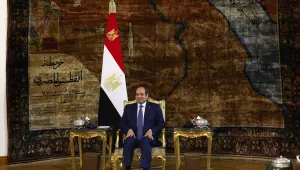On October 21, 2021, James Snyder, senior fellow at the Middle East Initiative and executive chairman of the Jerusalem Foundation, Inc., welcomed David Grossman for a virtual conversation on “Israel and the Middle East through a Literary Lens.” Grossman is an acclaimed Israeli author of fiction and non-fiction, and most recently published a new novel, titled More Than I Love My Life, which he discussed at length during the event.
More Than I Love My Life is based on the true story of Eva Panić-Nahir, who Grossman befriended in the last twenty years of her life. She was born to a Jewish family in Croatia and, after falling in love with a non-Jewish Serbian officer during World War II, was sent to a Gulag. Grossman explained that her narrative allowed him to explore the psychological effects of occupation and displacement, elements central to Panić-Nahir’s life and the lives of the millions of displaced people across the world today.
Grossman says that Panić-Nahir’s story emphasizes how easily we can “become prisoners of our official story” when we forget that everyone else has one as well. In acknowledging that everyone, even our enemy, has their own story, he said, “something is...released in us, we become [freer] and… are not totally trapped by it.”
Grossman argues that this approach can and should be applied at the individual and national level. Our national narratives are based, in part, on some original myth of national identity that can preclude understanding of and with our enemies. If we can find ways to “allow the narrative of our enemy to infiltrate into our inner narrative,” he said, we might better recognize our commonalities and find opportunities for communication.
This concept is integral to Grossman’s vision for the future of Israel and Palestine – he says he does not want to live in a “fortress,” but a “home.” He maintains that mutual recognition between Palestinians and Israelis is the path forward, saying “only if they will have their home, we shall have our home.” While this peace may be fragile at first and take years to consolidate, Grossman ultimately believes that “things will change, the definitions will become looser and more flexible and a new option of arrangements would be possible.”
Despite the political realities inherent to his writing, Grossman said his purpose is simply “to tell a good story.” He conceded that if there is one idea he hopes to impart to his readers, it is to “not be tempted by generalizations, stereotypes, prejudices, but really to insist on nuances.”
Watch the recording of this event here.


